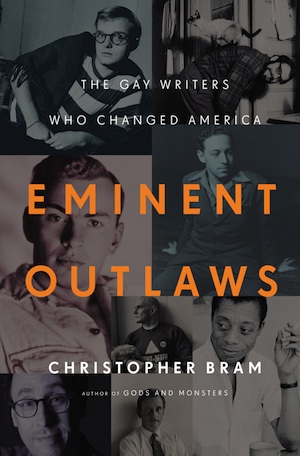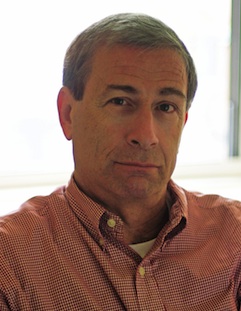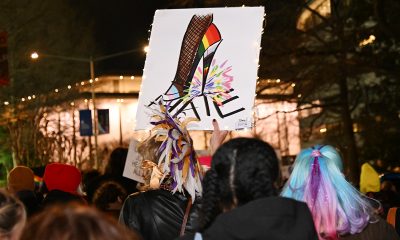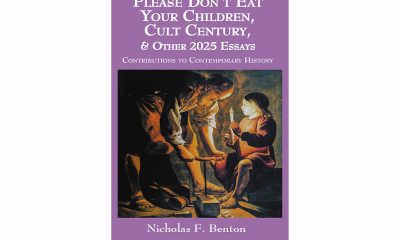Arts & Entertainment
Ahead of their time
New book explores how 20th century writers put gay issues on America’s radar
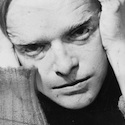
Gay writer Christopher Bram knew in researching his new book, which involved excavating ancient reviews of the work of prominent queer authors of the mid-20th century and beyond, he’d find ugly instances where homophobia colored the various assessments — he just didn’t realize how unrelenting and vitriolic it would be.
“I just wasn’t prepared for how mean and ugly and vicious the reviews could be of anything gay from the ‘50s well into the ‘80s,” Bram says during a phone chat from San Francisco. “The amount of anti-gay feeling among literary straight people just floored me. Even from people who were more on our side, the amount of condescension and this sneering, snickering tone, it got quite tiring and I only ended up quoting about half of what I found.”
The book, out this month, is “Eminent Outlaws: the Gay Writers Who Changed America” (Twelve Books, $27.99). Bram’s premise is that the work of mid-century gay writers such as Truman Capote, Gore Vidal, James Baldwin, Allen Ginsberg, Tennessee Williams and others, on through to later novelists and playwrights such as Christopher Isherwood, Edward Albee, Edmund White, Armistead Maupin, Mart Crowley and Tony Kushner, was a literary revolution that laid the post-World War II groundwork for the modern gay rights movement. Bram, author of “The Father of Frankenstein” (adapted for the screen as the Oscar-winning film “Gods and Monsters”) and eight other novels, says the writers he includes in the book “introduced America to gay experience and sensibility and changed our literary culture.”
It’s a weighty thesis that unleashes an ocean of questions, some covered in the book, others pitched at Bram during this week’s Blade interview. And with Oscar season upon us (they’ll be handed out in Los Angeles Sunday evening), it’s an especially timely moment to consider the seemingly disproportionate contributions of gay writers to the arts. Nearly all the writers he covers have had work adapted to the big screen so their cultural reach is far-ranging and every bit as considerable as their straight counterparts.
Bram was a fan of these writers for decades. About three years ago he was approached by another writer, Sam Wasson, who was researching a book about the film “Breakfast at Tiffany’s” (based on a Capote novel), and contacted Bram for literary context. After riffing on the state of gay life and gay writing in the ‘50s and thereafter in the U.S., it occurred to Bram that while nearly all of the writers he focuses on had been written about, there was no single book that explored how their lives and work — many of them knew each other — overlapped and fit into the cultural norms of the day while also influencing those norms often in shocking ways.
While much of the historical material in the book has been presented elsewhere — Bram says only a few points required fresh interviews — the overall story, he says, is not widely known but should be.
“There were all these little bits and pieces like this scattered jigsaw puzzle, but I really wanted to pull them all together to form one big picture,” he says. “What I did was connect the dots. Nobody had ever told this as a single narrative. There were some simple connections I was able to make, even something as simple and obvious as the fact that ‘Other Voices, Other Rooms’ (a gay-themed Capote book), ‘The City and the Pillar’ (from rival Gore Vidal) and the Kinsey Report all came out within a few weeks of each other in 1948, which is surprisingly early and yet it became really this powerhouse year where these gay books were suddenly getting all this attention.”
Bram says it was a uniquely American phenomenon the catalyst of which was the way World War II had “suddenly brought all these people together in the Army, the Navy — they were exposed to this other type of sexuality, to bad language and profanity they’d never heard before and it didn’t take long for this to be reflected in the publishing industry.”
The book is setting gay tongues wagging and even those who’ve yet to read it, say Bram’s premise is intriguing.
Nicholas Benton, a local gay writer and founder/publisher of the Falls-Church News Press who’s written at length about the unique contributions of gays in culture and society, says that although he takes issue with some of Bram’s contextualization and assessments of some of his subject’s supposed lesser works — Benton’s about halfway through “Outlaws” — he calls it “a very important book with a lot of important information in it.”
So did these writers’ homosexuality and perhaps the outsider status it brought it with it make their work greater than it otherwise might have been?
“One of the features of being a gay person is you can’t help but have an alternate perspective on life,” Benton says. “A straight man walks in the room, sees the hot secretary and that’s all he can think about. A gay man comes in and notices the drapes clash with the rug. I mean obviously that’s an oversimplification, but gay sensibility has something to do with seeing the plight of people who are often invisible to the mind of a straight person … we bring an alternate perspective.”
Bram has a slightly different take. He says, “One would like to think (being gay) would create more empathy but maybe what we can say about homosexuality is much like what we say about religion — it makes the good people better and the bad people worse … for gays, that could mean being overly bitchy, negative or hypercritical of others or full of self pity that doesn’t turn to empathy, it could affect them in many different ways.”
Others say these writers helped America shed some of its Puritanical squeamishness toward sex and “grow up.” Ginsberg’s poem “Howl,” especially, is shockingly bold for its time. It’s amazing it got published in 1955.
“In the case of Williams, he was inestimable in helping to hammer the nails in movie censorship in post-war America,” says Drew Casper, a film expert and professor of critical studies at the School of Cinematic Arts at the University of Southern California. “Whether his adaptations came through strong or diluted, no mistaking his championing the importance of sex in the lives of his characters, often as a way for them to touch God. Sexuality is an important concern in gay life and relationships, so when gay writers take pen in hand, sexuality is a concern.”
Gay author William J. Mann, who has a bounty of novels and non-fiction Hollywood-themed books to his credit, says he’s “a huge fan” of Bram and “can’t wait” to read “Outlaws.” Mann calls the topic “fascinating” and “great.”
“The role of the arts is always to push what’s expected or what’s understood and certainly when you read the works of James Baldwin for example … you have this real sense of ground being broken and getting people to really understand the wider experience of humanity in a way that the world is much more than just your own little sphere of existence,” Mann says.
Bram says the writers he covers deserve enormous credit — whether it’s Vidal’s cheeky handling of transsexuality in “Myra Breckenridge” or Kushner’s sophisticated handling of the AIDS crisis in “Angels in America” — for getting gay topics on the cultural radar.
“They got the stories out there,” he says. “Homosexuality became a subject that straight and gay people could finally talk about and once people were talking about it, other people started talking about it too. It’s an example of where art did a better job than activism. ‘Boys in the Band’ was made into a movie in 1970 and it played in every major city in the country with prominent actors just a year after the Stonewall riots. In my group of friends at the time, none of us had heard of the Stonewall riots, but we’d all heard of ‘Boys in the Band.’”
Out & About
Plan your wedding the LGBTQ way
Washington D.C. LGBTQ+ Wedding Expo scheduled for Sunday
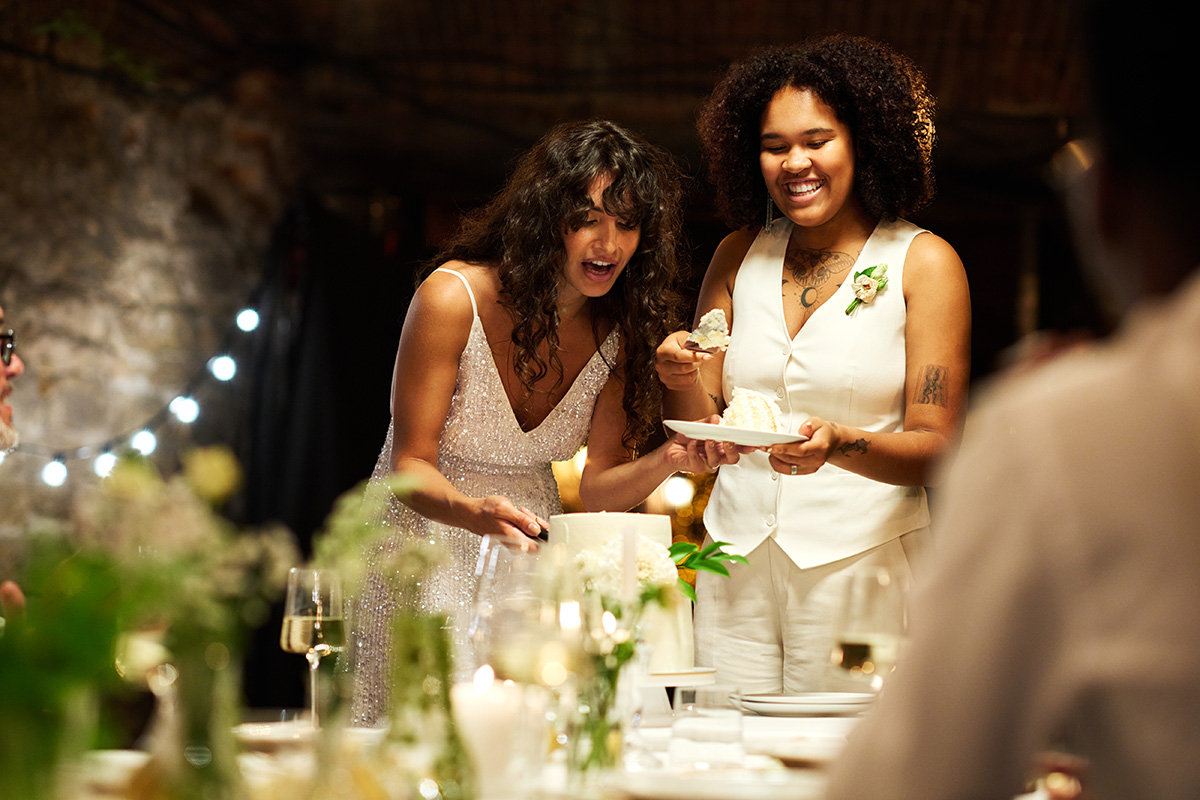
Rainbow Wedding Network will host “Washington D.C. LGBTQ+ Wedding Expo” on Sunday, March 1 at 12:30 p.m.
Guests can meet and mingle with a curated selection of LGBTQ-welcoming wedding professionals from across the region, each ready to help bring your vision to life, and spend a beautiful afternoon exploring everything they need to create a celebration that reflects them.
There will be a relaxed, self-guided look at the Watergate’s spaces and amenities, savor signature cocktails and delicious tasting samples, and connect with other couples who are on the same journey.
Visit Eventbrite to reserve a spot.
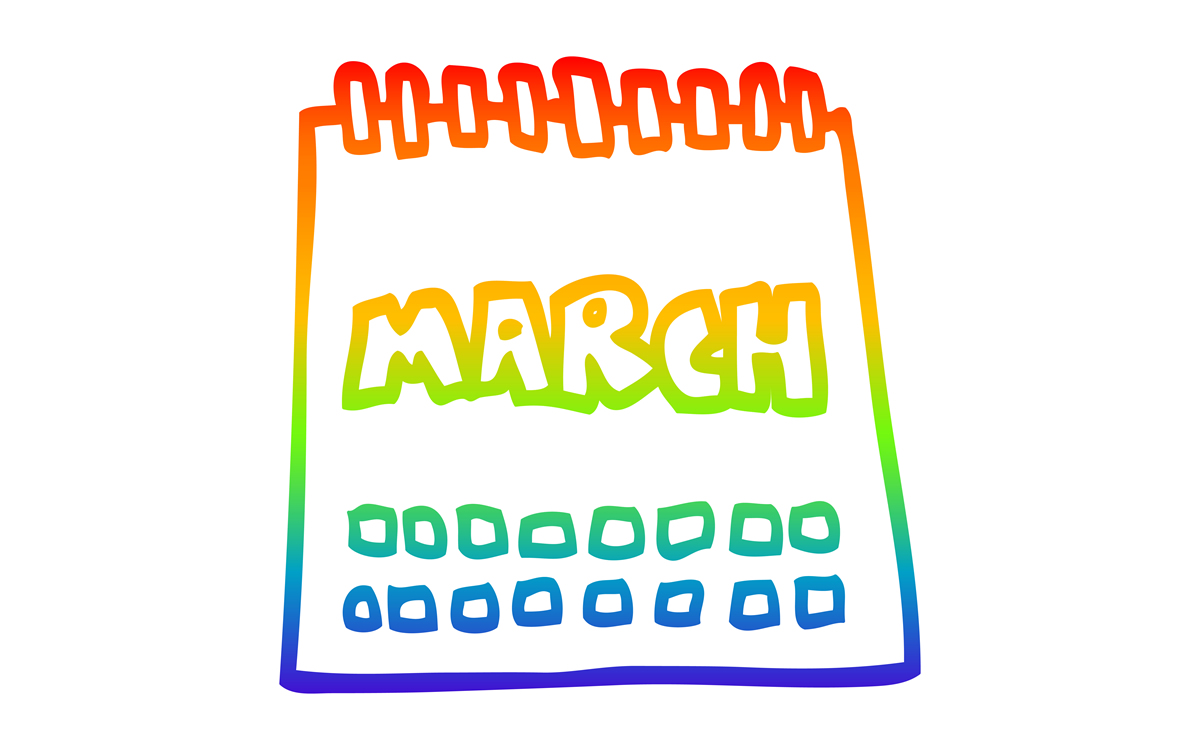
Friday, February 27
Center Aging Monthly Luncheon With Yoga and Drag Bingo will be at 12 p.m. at the DC Center for the LGBT Community. Email Mac at [email protected] if you require ASL interpreter assistance, have any dietary restrictions, or questions about this event.
Go Gay DC will host “LGBTQ+ Community Happy Hour Meetup” at 7 p.m. at Freddie’s Beach Bar and Restaurant. This is a chance to relax, make new friends, and enjoy happy hour specials at this classic retro venue. Attendance is free and more details are available on Eventbrite.
Trans Discussion Group will be at 7 p.m. on Zoom. This group is intended to provide an emotionally and physically safe space for trans people and those who may be questioning their gender identity/expression to join together in community and learn from one another. For more details, email [email protected].
Saturday, February 28
Go Gay DC will host “LGBTQ+ Community Brunch” at 11 a.m. at Freddie’s Beach Bar & Restaurant. This fun weekly event brings the DMV area LGBTQ+ community, including allies, together for delicious food and conversation. Attendance is free and more details are available on Eventbrite.
The DC Center for the LGBT Community will host “Sunday Supper on Saturday” at 2 p.m. It’s more than just an event; it’s an opportunity to step away from the busyness of life and invest in something meaningful, and enjoy delicious food, genuine laughter, and conversations that spark connection and inspiration. For more details, visit the Center’s website.
Black Lesbian Support Group will be at 1 p.m. on Zoom. This is a peer-led support group devoted to the joys and challenges of being a Black lesbian. You do not need to be a member of the Beta Kappa Chapter or the Beta Phi Omega Sorority in order to join, but they do ask that you either identify as a lesbian or are questioning that aspect of your identity.Send an email to [email protected] to receive the zoom link.
Sunday, March 1
LGBTQ+ Community Coffee and Conversation will be at 12 p.m. at As You Are. This event is for people looking to make more friends and meaningful connections in the LGBTQ community. Attendance is free and more details are available on Eventbrite.
Monday, March 2
“Center Aging: Monday Coffee Klatch” will be at 10 a.m. on Zoom. This is a social hour for older LGBTQ+ adults. Guests are encouraged to bring a beverage of choice. For more information, contact Adam ([email protected]).
Tuesday, March 3
Universal Pride Meeting will be at 7 p.m. on Zoom. This group seeks to support, educate, empower, and create change for people with disabilities. For more details, email [email protected].
Wednesday, March 4
Job Club will be at 6 p.m. on Zoom upon request. This is a weekly job support program to help job entrants and seekers, including the long-term unemployed, improve self-confidence, motivation, resilience and productivity for effective job searches and networking — allowing participants to move away from being merely “applicants” toward being “candidates.” For more information, email [email protected] or visit www.thedccenter.org/careers.
Center Aging Women’s Social and Discussion Group will be at 6 p.m. on Zoom. This group is a place where older LGBTQ+ women can meet and socialize with one another. There will be discussion, activities, and a chance for guests to share what they want future events to include. For more information, email [email protected].
Thursday, March 5
The DC Center’s Fresh Produce Program will be held all day at the DC Center for the LGBT Community. People will be informed on Wednesday at 5 p.m. if they are picked to receive a produce box. No proof of residency or income is required. For more information, email [email protected] or call 202-682-2245.
Virtual Yoga Class will be at 7 p.m. on Zoom. This free weekly class is a combination of yoga, breathwork and meditation that allows LGBTQ+ community members to continue their healing journey with somatic and mindfulness practices. For more details, visit the DC Center’s website.
a&e features
Transmission DC breathes new life into a storied sound space
A fresh home for boundary-pushing culture on H Street

Late last year, phoenix-style, a fresh home for boundary-pushing culture arose on the H Street corridor. Transmission DC – a queer, trans, and POC-owned, operated, and centered community-focused venue – powered on in the former home to the Rock & Roll Hotel (famously, not a hotel, but very much rock & roll). Transmission (1353 H St., N.E.) arrives secure in its mandate – or even birthright – to provide a place to celebrate creativity and music through a lens of inclusivity and respect.
Transmission’s team brings experience, but also representation. Owners/partners Kabir Khanna (who is also programming director), Katii B, Ellie McDyre, and Kelli Kerrigan together previously managed 618 productions, a venue in Chinatown, crafting “some of D.C.’s freakiest parties, raves, and mosh pits” they note.
They packed up operations last fall to a space curated specifically for D.C.’s underground music and culture scene, building their efforts in Chinatown to bring in more fans in queer and POC circles.
Transmission, Khanna points out, is built on DIY values. In the music scene, DIY means that promoters and organizers – often disconnected from the mainstream and part of marginalized communities – build shows and programs collaboratively, but independently from institutions, supporting each other as smaller, independent venues close. Here, Transmission aims to ensure that those putting together these underground inclusive shows have a more permanent and stable home, can have access to resources, and can provide more sustainable income to artists. “We’re trying to get more people to support and enjoy the music, and also give artists and organizers within the DIY community more structure and a larger cut,” says Khanna.
Khanna also notes that Transmission operates “under the principles of safety, inclusivity, and respect.” McDyre added that even at venues that claim inclusivity, that statement might not take place in practice. We’re “not just pitting up a rainbow flag,” says McDyre, but as some of the owners are trans and POC, audiences can see themselves reflected at the top.
Much like the DIY nature of the music community, the Transmission owners brought a DIY ethos to turning around their space.
In March 2020 – the height of COVID lockdowns – Rock & Roll Hotel suddenly shuttered, though not due to the pandemic; instead, the venue claimed that decreasing sales and increasing competition led to the closure. For 14 years, it was the central spot for cheap beer and lesser-known and celebrated acts. The space stood vacant for more than five years, until Transmission turned the power back on.
“When we got into the space, it was effectively abandoned for years,” says Khanna. “There was a ton of mold, and paint primer covering all surfaces. It was nearly falling apart.” Khanna noted that many music venues like this one, regardless of how well it was maintained, “get the shit kicked out of it,” given the nature of shows. The team called in mold removal contractors, ripped up most of the floorboards, and started fresh.
Transmission’s first floor is styled as a stripped-down black box: the better to take in the music. “It’s minimal on purpose to act as a canvas for set design and music,” without a specific aesthetic, says Khanna. Moving upstairs, the second floor has been opened up, removing some walls, and now has a larger dance area than the first floor. Beyond the first two performance levels, and a holdover from Rock & Roll Hotel, is the rooftop. Though without a stage, the rooftop space is filled with murals splashed across the walls, with a full bar. Transmission’s current capacity is 496, but the team is looking to grow that number. Transmission will also leverage the full kitchen that Rock & Roll Hotel operated, bringing in Third Hand Kitchen to offer a variety of food, including vegan and vegetarian options.
Khanna pointed out an upcoming show reflective of Transmission’s inclusive ethos: Black Techo Matters on Feb. 27. The event is set to be “a dynamic, collaborative night of underground electronic music celebrating Black History Month.” Khanna says that techno came from Black music origins, and this event will celebrate this genesis with a host of artists, including DJ Stingray 313, Carlos Souffront, and Femanyst.

